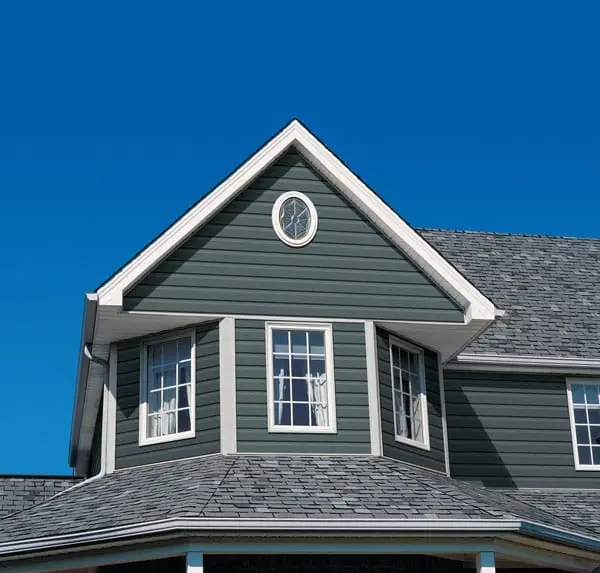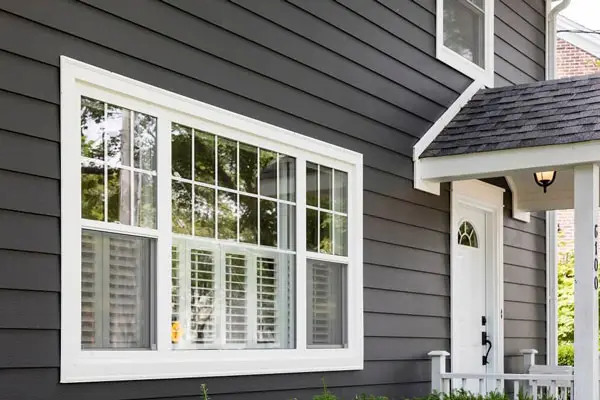The environmental impact and carbon footprint of home improvement products is a major concern for many New England homeowners. From natural resource depletion, to air and water pollution, you might be wondering about sustainable window materials.
The good news is that vinyl windows are eco-friendly. Vinyl windows are recyclable, too! Let’s talk about all the reasons for what makes vinyl windows eco-friendly.
Environmental Impact of Vinyl Window Frames
Let’s start with what makes vinyl window frames a great choice for the environment.
Vinyl window frames are made from PVC, the third most widely-used plastic in the world. PVC is used to make an endless amount of different products. People can recycle vinyl windows that are no longer performing up to par into many different products.

Vinyl windows are also easy to install and maintain. They don’t require using strong cleaning products, painting, or staining. Recycling the materials in vinyl windows makes them eco-friendly. These items include piping, picnic tables, seat coverings, footwear, medical devices, blood storage bags, and much more.
Not only does this keep the old window frames out of the landfill, it gives the material an entirely new purpose.
Vinyl Window Recap:
- Requires very little natural resources
- Does not require harvesting of wood
- Easy and cost-effective to install
- Excellent insulator with foam inside the window frame chambers
- Argon and krypton gases inside the window chambers will enhance insulation power
- Can help reduce your carbon footprint by using less heating and cooling
- Lasts for life

Is Vinyl The Most Sustainable Window Material?
Vinyl is by far one of the most sustainable window materials available today. Here is how vinyl windows stack up against other window materials:
Fiberglass Windows
Fiberglass replacement windows can be energy efficient and highly insulating. However, in terms of recycling, fiberglass comes nearly at the bottom of the list.
Fiberglass is a challenge to recycle because it’s made from sand. It requires a special process to break down the materials to use for recycling.
Fiberglass Window Recap:
- Can be highly insulating with the right combination of technology
- Good insulator
- One of the worst options for sustainable window materials
- Made from sand
- Very difficult to break down the materials
- Triple weatherstripping barrier will help conserve even more energy
Aluminum Windows
Aluminum windows are more eco-friendly than wood or fiberglass. That’s because aluminum is a readily available material from the earth’s crust. It also does not require the harvesting of any trees to produce.
The downside of aluminum as an eco-friendly option comes down to performance problems. Aluminum is a poor insulator and will not hold heat inside your home as well as other materials. Aluminum window frames are also prone to condensation.
Furthermore, aluminum windows are not friendly for coastal homes in the New England region. They can rust and corrode from saltwater and sea air.
Aluminum Windows Recap:
- Sustainable option for window materials
- Does not require harvesting of trees
- Poor insulator
- Can result in higher heat bills
- Not friendly for coastal homes
- May corrode and rust from saltwater
- Prone to condensation
Wood Windows
Of all sustainable window materials, you’d think wood would be the best, right? After all, it’s a natural material and it can last a long time. This is a misconception with many New England homeowners. If you’re concerned about the environment, wood windows are not the way to go for several reasons:
- Depletes natural resources
- Requires harvesting of trees
- May require long travel for shipment. Wood windows are typically produced from pine or Douglas Fir, which may need to be shipped from the Pacific Northwest or portions of Canada.
- Wood window frames must be specifically certified by the U.S. Forest Stewardship Council to be considered eco friendly
Sure, wood windows are recyclable, but at what cost? They’re pricey on your pocketbook and taxing on the environment, so our advice is to think twice before choosing wood as your new eco-friendly material
Learn more about wood windows vs vinyl windows
Debunking Toxic Chemical Concerns
Some homeowners are concerned about toxic chemical release during the manufacturing of vinyl windows.
The truth is this, vinyl windows do not add toxins into the environment during their production. They produce low greenhouse gas emissions and are not a major source of toxic chemicals such as Dioxin, according to the EPA.
- Dioxin is not produced or used commercially in the U.S. Levels of dioxins in the U.S. have decreased over the last 30 years. However, vinyl production has increased during the same period. This comes as no surprise as 25.3 million homes in the U.S. have PVC-based windows.
- Vinyl window production does not pose a serious exposure issue to phthalate plasticizers. After studies by worldwide scientists and government agencies, it’s determined that exposure is significantly lower than any levels of concern that are set by regulatory agencies.
- In the U.S., the use of heavy metal stabilizers have been almost entirely phased out of vinyl consumer products, including vinyl windows.

Get Eco-Friendly Windows from Coastal Window & Exteriors
Coastal Window & Exteriors offers high-performance vinyl windows, perfect for homeowners who are concerned about the environment. Best of all, our vinyl replacement windows are designed to last for life!
Contact one of our representatives today for a FREE quote!
Sources:
- https://en.wikipedia.org/wiki/Polyvinyl_chloride
- https://www.epa.gov/dioxin/learn-about-dioxin
- https://www.dwmmag.com/survey-multi-pane-windows-now-on-59-percent-of-homes/
- https://www.kbhomesnj.com/choosing-a-window-material-vinyl-or-fiberglass/#:~:text=Recycling%20fiberglass%20is%20a%20challenge,filler%20for%20other%20construction%20materials
- https://www.monumentalwd.com/aluminum-windows-doors-the-green-alternative/
- https://www.nwf.org/Educational-Resources/Wildlife-Guide/Plants-and-Fungi/Douglas-Fir


